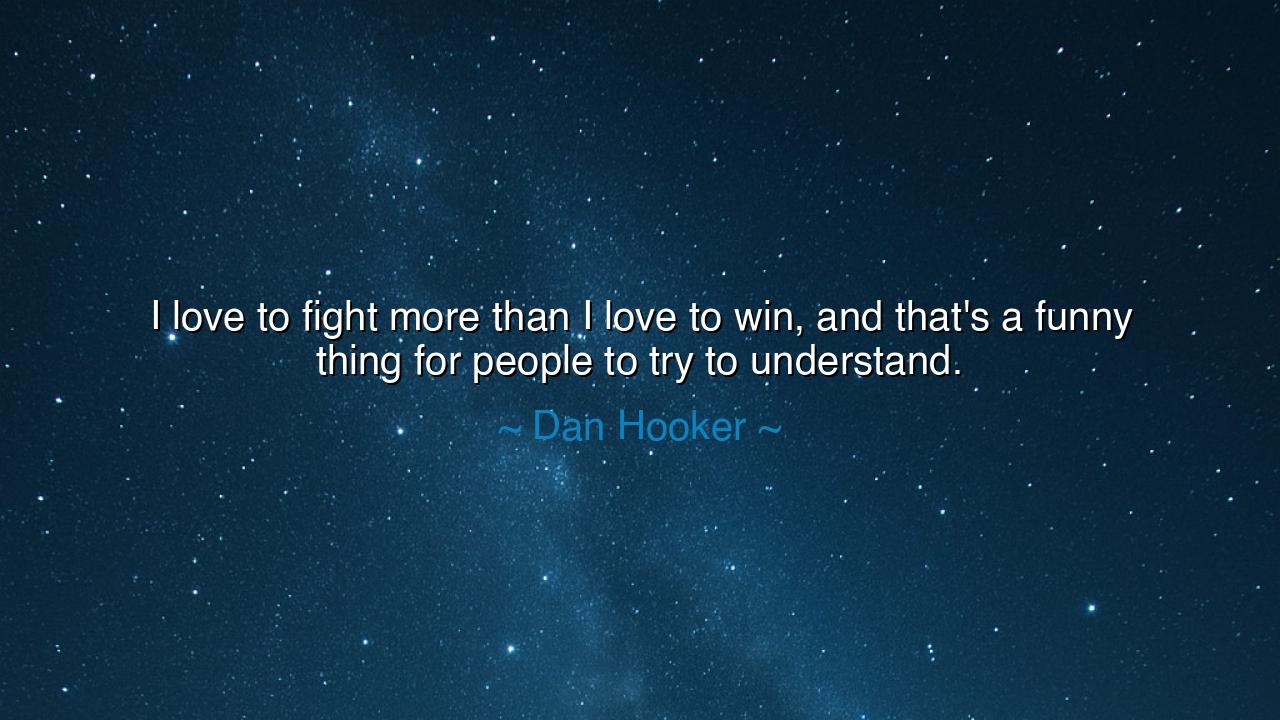
I love to fight more than I love to win, and that's a funny thing
I love to fight more than I love to win, and that's a funny thing for people to try to understand.






The words of Dan Hooker—“I love to fight more than I love to win, and that’s a funny thing for people to try to understand.”—carry the voice of the warrior philosopher, a man who has looked deeply into the nature of struggle and found beauty within it. Beneath this confession lies a truth that the ancients knew well: that the path is nobler than the prize, and that the true spirit of battle lies not in triumph, but in the sacred joy of the challenge itself. Hooker’s words are not about violence, but about devotion—devotion to craft, to courage, to the pursuit of one’s own limits. In this, he joins the lineage of all who have understood that mastery is not measured in victories, but in the willingness to keep rising, to keep fighting, even when victory is uncertain.
To “love to fight more than to win” is to honour the process more than the outcome. It is the mark of a soul that seeks truth, not comfort. For the fight—whether in the ring, in the mind, or in the heart—is the crucible where character is forged. In that place of uncertainty and fear, the fighter meets himself, stripped of illusion. Winning is fleeting; it fades with applause. But the battle, the struggle, the raw encounter with one’s own weakness and will—this endures. Hooker reminds us that those who truly walk the warrior’s path do not seek the crown, but the confrontation. They crave the test, for it is only through the struggle that the self becomes real.
The ancients understood this with great clarity. The Greek poet Pindar once wrote that the athlete’s glory was not in victory alone, but in the contest itself—in the agony of training, in the dust of the arena, in the courage to stand before the unknown. Likewise, Alexander the Great was said to have admired not only the conquerors, but the soldiers who bled and failed and rose again. For these men knew that the battle’s fire refines more than the sword—it refines the soul. Hooker’s love of the fight, even above winning, echoes that same ancient reverence for struggle as transformation.
There is also humility in Hooker’s words, though it is a humility hidden in strength. To love the fight is to admit that one is forever unfinished—that each contest reveals new weaknesses, new lessons, new truths. The one who loves only to win seeks finality, but the one who loves to fight embraces infinity. He understands that every battle, even a loss, is a teacher. The joy is not in proving superiority, but in becoming more than you were before. This is why such devotion seems strange to others. The crowd loves the victor; the warrior loves the struggle. The crowd sees glory in the moment; the warrior sees eternity in the process.
Consider the story of Miyamoto Musashi, the legendary samurai of Japan. He fought more than sixty duels, undefeated, yet in his later years he withdrew from the world, declaring that the truest victory was mastery of the self. Musashi loved the fight not for blood or pride, but for the purification it offered. Every strike, every wound, every confrontation was a mirror reflecting his discipline and spirit. Like Hooker, Musashi knew that the warrior who fights only for victory becomes a slave to results; but the one who fights for love of the fight becomes free—for he finds meaning even in defeat.
Hooker’s words, then, are not merely about combat—they are a lesson for every seeker, artist, and worker of life. To love the fight more than the win is to fall in love with effort itself, to find joy not only in success but in striving. Whether you are building, learning, or healing, it is not the triumphs that define you, but the persistence with which you return to your craft, your purpose, your calling. The world worships outcomes, but the wise know that the divine lives in process, perseverance, and presence. The fight, not the victory, is what transforms us.
So let this be your teaching: seek not the easy victory, but the worthy struggle. Do not measure your worth by the trophies you hold, but by the courage with which you rise when they are taken from you. Love the challenge, the climb, the clash. Let difficulty become your teacher and doubt your companion. For the one who learns to love the battle becomes indestructible—not because he always wins, but because he is always becoming.
And thus, in the words of Dan Hooker, we find a truth that echoes through the ages: the joy of life is not in the triumph, but in the fight itself. To love the fight more than the win is to live with purpose, to embrace growth over comfort, and to discover that the greatest victory is not over others, but over oneself.






AAdministratorAdministrator
Welcome, honored guests. Please leave a comment, we will respond soon